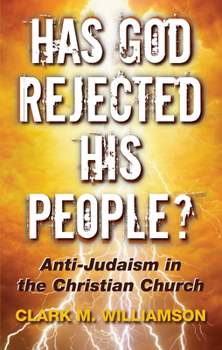Has God Rejected His People?
Select Format
Select Condition 
Book Overview
The point of this book is simple: to make Christians aware of a story that they have not been told--the story of relations between Christians and Jews. This involves tracing the church's anti-Judaism to its source in the gospels and the Book of Acts and describing the development of the church's displacement-replacement theology according to which we new Gentiles, spiritual, universal, inclusive Christians replace the old, carnal, ethnocentric legalist and works-righteous Jews in the favor of God. The story also details the actions of the churches, specifically a long chain of canons (laws) governing relations between Jews and Christians, all the way from banning Christians for socializing or dining with Jews, marrying Jews, and asking rabbis for blessings, to requiring all Jews to live in ghettos. This history of actions comes down to the present and its consequences in the Holocaust in which all the killers were Christians and in the Nazi laws governing Jewish behavior. Each such law took its precedent from a canon law passed by a council of the church. The recent rash of bomb threats against Jewish Community Centers and synagogues reminds us of how deeply this bigotry is embedded in people. The point of making people aware of anti-Judaism is to prompt them not to shrug if off when scripture readings regularly teach contempt for Jews with the rhetoric of vilification. Words are important. Teaching contempt should be called out and rejected. This can be done pastorally and gently, but it should be done. Otherwise the church's language reinforces a deeply embedded bigotry. Most Christian pastors are unaware of this reality and prone to thinking that anti-Judaism is not a serious problem for the church. Hence most anti-Judaism in Christian preaching is unintentional. Awareness of the story of Christian anti-Judaism prods us to move from unintentional anti-Judaism to intentional teaching of respect for Jews and Judaism.
Format:Paperback
Language:English
ISBN:153261859X
ISBN13:9781532618598
Release Date:November 2017
Publisher:Wipf & Stock Publishers
Length:190 Pages
Weight:0.85 lbs.
Dimensions:0.5" x 5.4" x 8.4"
Customer Reviews
1 rating
The covenant is still secure...
Published by Thriftbooks.com User , 22 years ago
Clark Williamson, professor emeritus of systematic and philosophical theology, has spent a great deal of his career in an effort to strengthen Jewish-Christian dialogue, and in particular, examining and working to correct subtle and blatant anti-Judaism and anti-Semitism in the Christian church. Unlike other minority groups (people of colour, women, etc.) who might be found among the members of a church's congregation, it is unlikely the Jewish people will be found regularly in Christian congregations, hence their voices are unlikely to be heard from within the community.Anti-Judaism and anti-Semitism are related but not precisely the same phenomenon. In this book, Williamson looks at the history of the relationship between Judaism and Christianity, with a special emphasis on the strains of anti-Judaism that have been present in Christianity since the first century of the Common Era. Beginning with a look at the historical Jesus, Williamson claims that the principle of dissimilarity does a disservice to both Christianity and Judaism. There is a tendency in biblical scholarship to position Jesus over against the Judaism of his time, particularly Pharisaic Judaism, concentrating on those features and attributes of Jesus most different from Judaism, and virtually ignoring the things that are the same. Jesus was a rabbi, proclaimed such before and after the resurrection, according to the biblical witness -- why not treat him as such?Williamson proceeds to examine the crucifixion, the witness of Paul, and the growing division between the followers of Jesus (many of whom were Jewish) and developing rabbinic Judaism in the aftermath of the destruction of the Temple, and later Jerusalem. The fact that the gospels were written for an audience that included Jews was lost in later centuries; Paul's struggle to keep the traditions together failed due to a backwards reading of his theology. Williamson traces the longer history of anti-Judaism in the church in his chapter 'From Barnabas to Barth'. Looking at the work of many influential figures, such as Irenaeus, Tertullian, John Chrysostom, leading up to the Reformation, and then later, to figures such as Bonhoeffer and Barth. Williamson is sensitive to Bonhoeffer's status as a martyr against Hitler, but makes the somewhat surprising statement that both Hitler and Bonhoeffer ultimately sought a world without Jews -- only Bonhoeffer's wish would be to convert the Jews to Christianity, a very different project than the Holocaust, but underpinned by the same kind of anti-Jewish strand that made events such as the Holocaust possible. In addition to the theological development of anti-Judaism, there was the canonical/administrative development of anti-Judaism, whose history Williamson also recounts. The final section of this text begins Williamson's project, to be continued in his later works, of a post-Holocaust theology that recognises the contribution of Judaism to Christianity, and seeks to find a b





